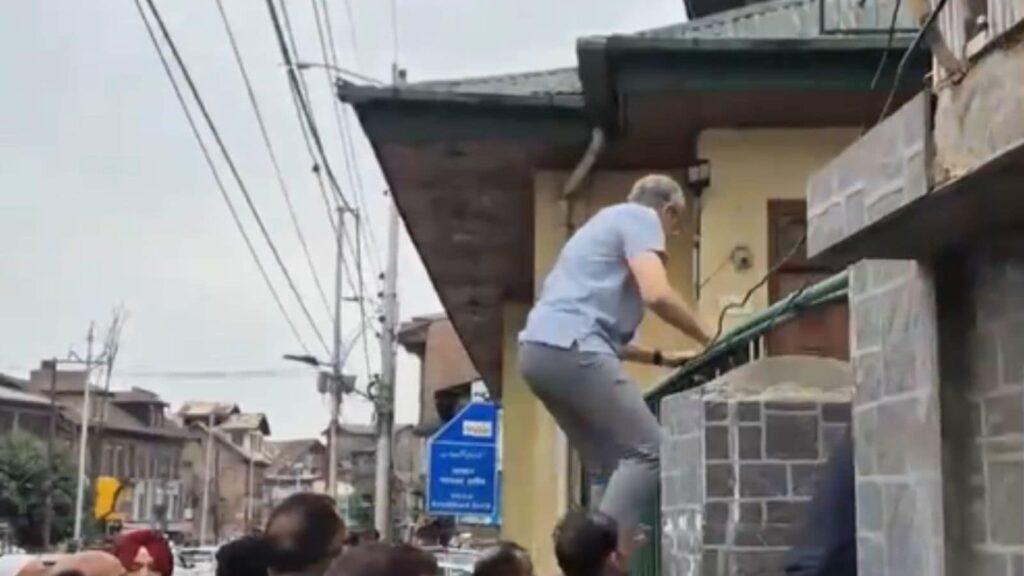When Jammu and Kashmir Chief Minister Omar Abdullah defied police restrictions to scale a cemetery wall in Srinagar’s Old City on Monday to pay tributes to martyrs of July 13, 1931, he wasn’t just putting the distance between him and police officers trying to hold him back. It also appeared to be a step back from his so far cooperative stance with the Lieutenant Governor’s office.
Emerging from the cemetery, Abdullah said: “For the sake of it, they (the LG administration) say this is a free country but sometimes they think this is their estate, and we are their subjects. But let me be clear, we are not anyone’s slaves. If we serve anyone, it is the people.”
Since coming to power as CM in October last year, Omar has not only avoided confrontation with the Centre, but also made an effort to cooperate with it and its representative in the Union Territory. He did so in the face of what were seen as “provocations” by the Raj Bhavan, as well as criticism by Valley-based Opposition parties who accused his National Conference (NC) government of “compromise” with Delhi – a charge that had started gaining traction among the people.
Abdullah’s stance was initially even welcomed by some as a mature attitude, for making the best of a bad situation given that as CM in a UT, his powers were restricted. He is also naturally perceived as non-confrontational. The other reason for the course he took was believed to be his hope that cooperating with the Centre would persuade the latter to restore statehood to J&K. Compared to the demand to restore Article 370, statehood is the easiest concession for the Centre to make as it has itself promised several times to do so.
Abdullah, in fact, did not raise the demand for Article 370 even though the NC had this in its poll manifesto. He admitted that it was impractical to ask the same government that had taken away the special status to give it back. Besides, even restoration of statehood would restore to the CM post crucial powers, helping him solve problems of the people.
The CM’s outburst against LG Manoj Sinha Monday was a sign that he had decided to heed to the section of his party which fears that “unconditional cooperation” with the Centre and Raj Bhawan had started denting the NC’s image among the people.
Martyrs’ Day provided the perfect opportunity for Abdullah to give an answer to his critics, being a protest against the security apparatus – that comes under Sinha – and being an emotional issue that cuts across mainstream and separatist parties in the Valley.
On Tuesday, addressing an event in Srinagar, Abdullah seemed to repeat his message to the LG administration, saying: “Hamari sharafat ko hamari kamzori mat samajhiye (Don’t see our decency as our weakness).” His government would not compromise on the aspirations of the people of J&K, he said.
Without naming either the Centre or the LG, Abdullah said it were the people who had elected the NC to power and it was “not a favour from anyone”. He and his colleagues “did not violate” any law by visiting the martyrs’ grave, he said, adding that police should not have stopped him. “If there were restrictions on the visit, they were imposed on July 13, not the following day.”
An NC leader said: “It is obvious. There is a change of strategy. The support by various Opposition leaders (from across the country) has vindicated Omar sahib’s stand that what was done to him on Monday (by not letting him visit the martyrs’ cemetery on Martyrs’ Day) was wrong.”
“It is obvious. There is a change of strategy. The support by various Opposition leaders (from across the country) has vindicated Omar sahib’s stand that what was done to him on Monday (by not letting him visit the martyrs’ cemetery on Martyrs’ Day) was wrong,” an NC leader said.
West Bengal CM Mamata Banerjee, Tamil Nadu CM M K Stalin, and other Opposition leaders like the RJD’s Tejashwi Yadav and the Samajwadi Party’s Akhilesh Yadav extended support to Abdullah after images of him scaling the fence to visit the graveyard surfaced.
In contrast, the Opposition in the Valley is not as taken in. Abdullah’s rivals termed Monday’s events as “theatrics and shadow boxing”, and said there was no way the CM could have reached the site if the police were serious about stopping him. “So you were grappled, poor CM sahib. I feel bad not for the grappling but the poor choreography, even the poorer storyline… They (police) are professional grapplers. If they mean business, they don’t let go, once they grapple…,” People’s Conference leader Sajad Lone posted on X, referring to Abdullah’s own post about being “grappled” by police.
A Peoples Democratic Party (PDP) leader said the action of Abdullah “was too little, too late”. “He cannot have a Plan B at this stage when the NC has already given up on the mandate, which was to fight for the people. The NC has ceased to exist as a party. It is the Department of National Conference right now,” the leader said.
Article 370 restoration was not the only fight the NC had given up, the PDP leader said. “They are not talking about prisoners, the termination (of services of government employees over alleged militant links) and demolition of houses. Omar only made a generic statement that they are not anybody’s slaves. It is shadow boxing,” the leader said.
Another PDP leader asked why Abdullah was not even in the Valley most of Sunday. “Martyrs’ Day is a historic day. If they were serious, they should have helped pass the (PDP) resolution (on declaring Martyr’s Day as a holiday) in the Assembly, which had a legal as well as symbolic message. The rest is optics,” the leader added.

